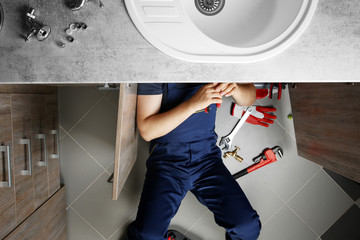
How to Become an Expert Plumber
A plumber is a person who is specialized in fixing plumbing issues. They can repair any plumbing problem, from kitchen faucets to pipes, toilets and sewage systems. They can also fix gas leaks if they are not fixed properly. Moreover, they can provide a guarantee for their work.
 Plumbing devices can help plumbers perform their work efficiently. They’re especially helpful when dealing with clogged drains. A drain snake is a cable-like tool with a corkscrew tip that can be pulled through a pipe to break apart and remove clogs. These tools are available in manual and motorized designs, making them versatile and easy to use.
Plumbing devices can help plumbers perform their work efficiently. They’re especially helpful when dealing with clogged drains. A drain snake is a cable-like tool with a corkscrew tip that can be pulled through a pipe to break apart and remove clogs. These tools are available in manual and motorized designs, making them versatile and easy to use.
Hand augers are another type of tool that is popular among plumbers. These devices are similar to a drain snake, but have an automatic feed that facilitates the movement of a cable in and out of a pipe. A plumber may also need to use a soldering torch when working with copper or plastic piping. This is a necessary skill because soldering can seal new piping.
Trenchless sewer line repair is an innovative method of repairing sewer lines that doesn’t require extensive excavation. The process is often faster than traditional sewer line replacement, and can be done in a day or less for smaller repairs.
The trenchless sewer line repair technique involves a thin pipe liner being fed through the damaged section of your sewer line by a specialized winch tool. This liner fills the entire damaged area and hardens into a water-tight seal when dry.
It’s a great solution for cracked or leaking pipes that occur from ground settling, root systems taking hold, or other damage. The epoxy used in this technique also increases the longevity of rehabilitated pipes, and can last for up to 50 years.
Another option is directional drilling, which is a method of replacing a damaged sewer line. This procedure is usually used if a line has severe corrosion or old age, making fixing impossible with the more conventional trenchless methods.
Listening skills are essential for plumbers, as they must listen to clients in order to determine their problems. This will allow them to understand what needs to be done and how long it will take.
Expert plumbers also exhibit excellent communication skills. This means that they’ll be able to explain their plumbing problems clearly and recommend the best solutions for their clients.
They should also have good organizational skills, as they need to organize all the necessary documents and tools needed for a job before they start working on it. Without this, they might not get everything done properly and could end up with a lot of delays.
The active listening skill involves asking questions, understanding what’s being said and reflecting on it. Reflection keeps the speaker and the listener engaged in the conversation, which prevents misunderstandings and frustration on both sides. It also encourages collaboration and mutual responsibilities.
Plumbers assemble, repair and maintain pipes and systems that carry water and gas to and from homes and businesses. They also inspect and test plumbing to ensure it is in good working order. A typical job description for plumbers might include meeting with customers to complete work orders, responding to emergency calls and performing preventative maintenance. They may also install faucets, toilets and bathtubs.
Moreover, they often handle drainage and sewer issues, repairing or replacing broken lines or fixtures. This is not a sexy or glamorous profession, but it requires exceptional problem-solving skills and mechanical aptitude to succeed. Plumbers are also required to exercise regularly, as they bend, crouch and squeeze into tight spaces to reach difficult spots. They need to be strong enough to haul heavy pipes and equipment around all day.
Plumbing jobs remain in high demand and are among the most lucrative in the construction industry. Young people interested in this trade have several options for entering the industry. Most plumbers complete apprenticeship training that lasts from four to five years. Unions and trade associations and consists of classroom and on-the-job instruction often sponsor the training.
